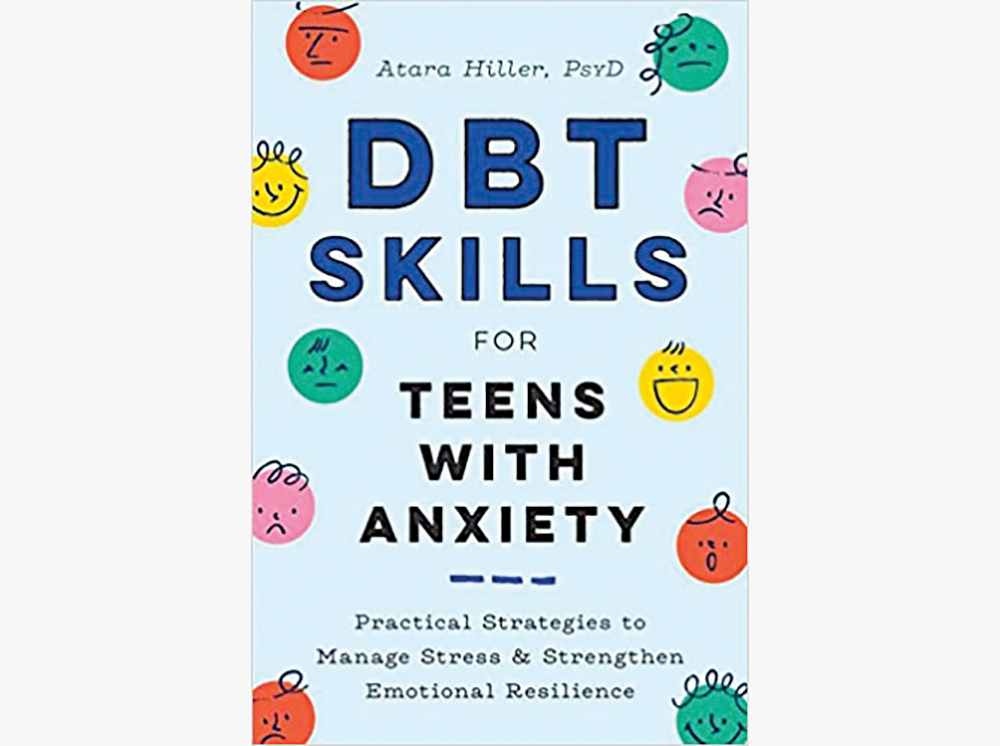By Deborah Melman
Reviewing: “DBT Skills for Teens With Anxiety: Practical Strategies to Manage Stress and Strengthen Emotional Resilience” by Atara Hiller PsyD. Penguin Random House. 2023. English. Paperback. 192 pages. ISBN-13:
978-0593435960.

Stress and stressful situations have existed since the beginning of time, although many readers may have the sense that incidences of stress have increased exponentially in recent years. The ability to cope with difficult situations seems to come easily for some people, while others become even more stressed as new situations arise. Years of COVID isolation made it harder for many people, especially children and teenagers, to learn good coping skills. While stressful incidents will never completely disappear from our lives, learning to manage and deal with them is an essential skill set.
Highland Park resident, licensed psychologist and dialectical behavior therapy-certified clinician Dr. Atara Hiller’s recently published book, “DBT Skills for Teens with Anxiety,” can help teens learn the necessary coping skills. It also serves as a workbook that parents can use to help themselves and younger children understand and work through stressful situations. DBT can help adolescents and teens get through tough times in their lives by teaching them how to manage anxiety, according to Hiller.
Most authors have an idea, write a book, and then look for a publisher. Hiller’s book took an unusual path—the publisher had an idea for a book and sought her out as the author because of her extensive experience in the field. “It was a great opportunity for me, and the timing worked out,” she said.
Hiller worked on the book for three months in 2022 and saw the book release in May 2023. “It was surprisingly a lot of fun to put the book together. As a DBT therapist teaching teens and caregivers, it was easy to put to paper what I work with every day.” She added that her love of reading, combined with her love of writing, made for a very “positive experience.” She also was gratified to see all the positive reviews posted by her colleagues and mentors as well as other readers. “My kids were so excited when a box of the newly printed books arrived and they saw my name printed on the cover.”
Hiller works with teens in clinical settings and has “noticed that referral levels are higher than ever.” The average age of teenage patients has been 16-17 years old, but more and more 12- and 13-year-olds have been coming in with pain from emotional distress. DBT helps people to balance change and use adaptive coping strategies to help manage their feelings and see the good in their lives. There are exercises and ways to practice skills to learn to deal with anxiety-inducing scenarios.
When asked if the prevalence of social media has exacerbated the levels of stress in teens, Hiller noted that it is a “double-edged sword.” While social media can be stress-inducing by promoting seemingly perfect lives, social media does have the redeeming quality of creating a sense of community and a safe place for teens without any other resources to get information.
Stressful situations aren’t going away any time soon. Unfortunately, too many teens use avoidance to ignore tough predicaments, only to find out that they have actually made the situation even worse. Scenarios and role play can be used to “cope ahead” and learn skills to help manage the cause of the stress. Proactivity in actions and breaking larger tasks into smaller ones can provide a sense of control and also lessen stress.

The book contains five skill modules with specially designed exercises and worksheets to help find a sense of calm and control even when life feels unbearably hard. Hiller advises that if the teen is uncomfortable with one of the exercises, they should skip it and move to the next one.
Another key is to understand the root cause of what is provoking the anxiety and identify specific actions to overcome it. Hiller says that “we need to be more flexible in our life experiences and learn not to be so hard on ourselves.” Teens can prepare for school exams and social events in similar ways. The more preparation and practice before the event, the better the event will turn out. Teens facing peer pressure, differing opinions, conflicts with parents, difficult coaches, challenging teachers or employers, social group changes, and other stressors can benefit from these coping exercises.
Atara Hiller is a psychologist and co-director of the Trinitas Institute for DBT and Allied Treatments in Elizabeth and in private practice at Center for Cognitive Behavior Therapy in East Brunswick.
For more information and to purchase the Penguin Random House book “DBT Skills for Teens With Anxiety,” visit
https://tinyurl.com/3ycxc8n9
Deborah Melman is a staff writer at The Jewish Link.








